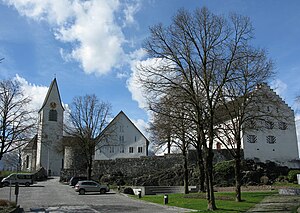Liechtenstein Institute
| Established | 1986 |
|---|---|
| President | Guido Meier |
| Director | Wilfried Marxer |
Academic staff | 10 |
Administrative staff | 5 |
| Location | , |
| Website | liechtenstein-institut.li |
The Liechtenstein Institute is a scientific research center and academic institution in Bendern, in the Principality of Liechtenstein.[1].
The institute carries out research in the history, politics, law, and economics of Liechtenstein. [2]

Institute
The Liechtenstein Institute was founded on August 15, 1986, the national holiday of the Principality of Liechtenstein by the initiative of Gerard Batliner as a research center for practical and fundamental research relating to Liechtenstein. The institute does not award degrees and does not offer lectures, which are typical for universities. Therefore, the Liechtenstein Institute is a university-like institution according to the higher education act of the Principality of Liechtenstein. The institute’s organising institution is an incorporated non-profit society, according to the private and corporate law of Liechtenstein.
Since 1998 the Liechtenstein Institute is located in the present building, the old parsonage on the chapel hill of Bendern.
In the first years, the founding of the institute relied solely on private contributions. Nowadays the public authorities provide two-thirds of the means.
Research
The historical research at the Liechtenstein Institute focuses on the time between the two World Wars and the transition to the reign of the Princely Family of Liechtenstein over the territory of the present state. The political and social science is primarily dedicated to the political system of Liechtenstein. The jurisprudence at the institute is concerned with the public law of Liechtenstein, particularly the administrative and constitutional law. The economic sciences at the Liechtenstein Institute was established as a complement to the business-oriented research at the University of Liechtenstein.
The results of the institute are published as books and papers in scientific journals. In addition to that, the institute compiles reports and surveys for the government of the Principality of Liechtenstein, government agencies and municipalities.
Furthermore the institute sponsors dissertations with relate to the country.
Lecture
The institute offers presentations, lecture series, and symposias for topics relevant to Liechtenstein.
Library
The Liechtenstein Institute has a special library for the specialist fields history, law, politics and economics with a focus on Liechtenstein. The library is publicly available. The books and journals are however not available for loan. The library has the profile of a research-oriented working library.[3]
External links
References
- ^ Government of Liechtenstein:
- ^ Liechtenstein Institute: Statut 2011. (PDF) . Retrieved on 2013-04-20.
- ^ Liechtenstein Institute: Jahresbericht 2011. (PDF) . Retrieved on 2013-04-20.
